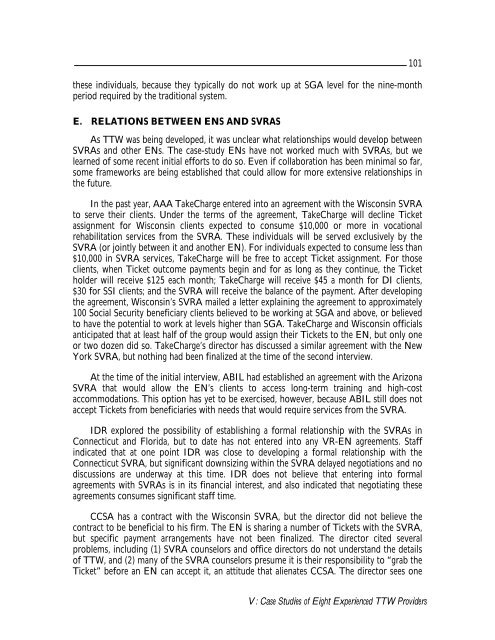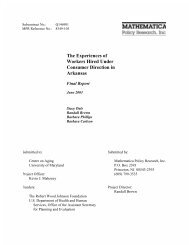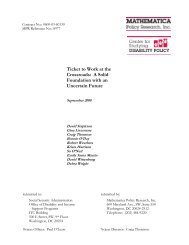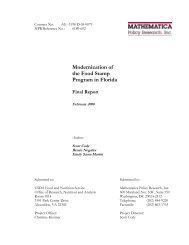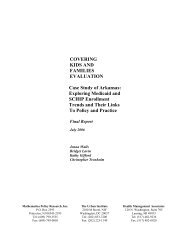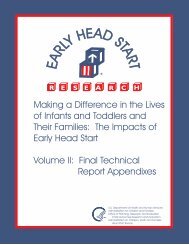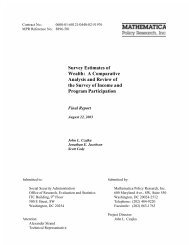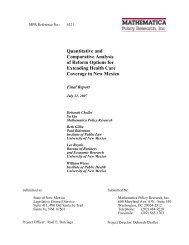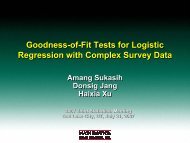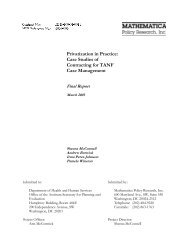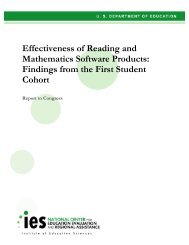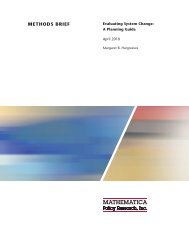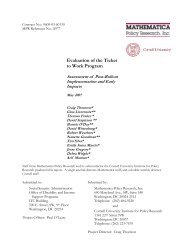Evaluation of the Ticket to Work Program Initial Evaluation Report
Evaluation of the Ticket to Work Program Initial Evaluation Report
Evaluation of the Ticket to Work Program Initial Evaluation Report
You also want an ePaper? Increase the reach of your titles
YUMPU automatically turns print PDFs into web optimized ePapers that Google loves.
<strong>the</strong>se individuals, because <strong>the</strong>y typically do not work up at SGA level for <strong>the</strong> nine-month<br />
period required by <strong>the</strong> traditional system.<br />
E. RELATIONS BETWEEN ENS AND SVRAS<br />
As TTW was being developed, it was unclear what relationships would develop between<br />
SVRAs and o<strong>the</strong>r ENs. The case-study ENs have not worked much with SVRAs, but we<br />
learned <strong>of</strong> some recent initial efforts <strong>to</strong> do so. Even if collaboration has been minimal so far,<br />
some frameworks are being established that could allow for more extensive relationships in<br />
<strong>the</strong> future.<br />
In <strong>the</strong> past year, AAA TakeCharge entered in<strong>to</strong> an agreement with <strong>the</strong> Wisconsin SVRA<br />
<strong>to</strong> serve <strong>the</strong>ir clients. Under <strong>the</strong> terms <strong>of</strong> <strong>the</strong> agreement, TakeCharge will decline <strong>Ticket</strong><br />
assignment for Wisconsin clients expected <strong>to</strong> consume $10,000 or more in vocational<br />
rehabilitation services from <strong>the</strong> SVRA. These individuals will be served exclusively by <strong>the</strong><br />
SVRA (or jointly between it and ano<strong>the</strong>r EN). For individuals expected <strong>to</strong> consume less than<br />
$10,000 in SVRA services, TakeCharge will be free <strong>to</strong> accept <strong>Ticket</strong> assignment. For those<br />
clients, when <strong>Ticket</strong> outcome payments begin and for as long as <strong>the</strong>y continue, <strong>the</strong> <strong>Ticket</strong><br />
holder will receive $125 each month; TakeCharge will receive $45 a month for DI clients,<br />
$30 for SSI clients; and <strong>the</strong> SVRA will receive <strong>the</strong> balance <strong>of</strong> <strong>the</strong> payment. After developing<br />
<strong>the</strong> agreement, Wisconsin’s SVRA mailed a letter explaining <strong>the</strong> agreement <strong>to</strong> approximately<br />
100 Social Security beneficiary clients believed <strong>to</strong> be working at SGA and above, or believed<br />
<strong>to</strong> have <strong>the</strong> potential <strong>to</strong> work at levels higher than SGA. TakeCharge and Wisconsin <strong>of</strong>ficials<br />
anticipated that at least half <strong>of</strong> <strong>the</strong> group would assign <strong>the</strong>ir <strong>Ticket</strong>s <strong>to</strong> <strong>the</strong> EN, but only one<br />
or two dozen did so. TakeCharge’s direc<strong>to</strong>r has discussed a similar agreement with <strong>the</strong> New<br />
York SVRA, but nothing had been finalized at <strong>the</strong> time <strong>of</strong> <strong>the</strong> second interview.<br />
At <strong>the</strong> time <strong>of</strong> <strong>the</strong> initial interview, ABIL had established an agreement with <strong>the</strong> Arizona<br />
SVRA that would allow <strong>the</strong> EN’s clients <strong>to</strong> access long-term training and high-cost<br />
accommodations. This option has yet <strong>to</strong> be exercised, however, because ABIL still does not<br />
accept <strong>Ticket</strong>s from beneficiaries with needs that would require services from <strong>the</strong> SVRA.<br />
IDR explored <strong>the</strong> possibility <strong>of</strong> establishing a formal relationship with <strong>the</strong> SVRAs in<br />
Connecticut and Florida, but <strong>to</strong> date has not entered in<strong>to</strong> any VR-EN agreements. Staff<br />
indicated that at one point IDR was close <strong>to</strong> developing a formal relationship with <strong>the</strong><br />
Connecticut SVRA, but significant downsizing within <strong>the</strong> SVRA delayed negotiations and no<br />
discussions are underway at this time. IDR does not believe that entering in<strong>to</strong> formal<br />
agreements with SVRAs is in its financial interest, and also indicated that negotiating <strong>the</strong>se<br />
agreements consumes significant staff time.<br />
CCSA has a contract with <strong>the</strong> Wisconsin SVRA, but <strong>the</strong> direc<strong>to</strong>r did not believe <strong>the</strong><br />
contract <strong>to</strong> be beneficial <strong>to</strong> his firm. The EN is sharing a number <strong>of</strong> <strong>Ticket</strong>s with <strong>the</strong> SVRA,<br />
but specific payment arrangements have not been finalized. The direc<strong>to</strong>r cited several<br />
problems, including (1) SVRA counselors and <strong>of</strong>fice direc<strong>to</strong>rs do not understand <strong>the</strong> details<br />
<strong>of</strong> TTW, and (2) many <strong>of</strong> <strong>the</strong> SVRA counselors presume it is <strong>the</strong>ir responsibility <strong>to</strong> “grab <strong>the</strong><br />
<strong>Ticket</strong>” before an EN can accept it, an attitude that alienates CCSA. The direc<strong>to</strong>r sees one<br />
101<br />
V: Case Studies <strong>of</strong> Eight Experienced TTW Providers


